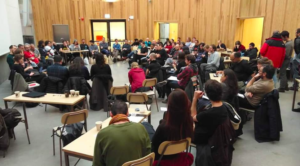Transnational Social Strike Platform is a network of base organised unions and other leftists organisations working with labour rights. A meeting of the network was hosted by its local participants in Stockholm, Sweden, from 23rd to 25th of November. A rider active in the Deliverunion campaign represented FAU Berlin. The theme, “Against the logistics of exploitation”, was related to a notion of ‘logistic control’: this control concerns the connections of production sites and labour over transnational production chains and differentiated working conditions, including such conditions as international subcontracting, outsourcing, privatisation and precarisation.

The opening session on Friday afternoon included a panel discussion, in which the main focus was on the right to strike. One of the inputs into discussion was the recent plan of the Swedish government to restrict right to strike: under the new law, it will be legal to strike only as part of collective bargaining for a national collective contract. Other inputs into discussion included the struggle of Georgian metro workers, who had used a hunger strike in their struggle as they were denied by a court decision their right to strike, as well as reports from the International Women’s Strike. In the discussion following the panel, participants were stressing that it is of crucial importance to defend the right to strike, and workers should strive to defend their right by striking. Nevertheless, the focus should not be excessively on legality issues, as it is essentially not so important if a strike is legal or not. Furthermore, it was recognised that strikes can take many forms, and we need to be creative in broadening our thinking and understanding on what a strike can be.
On Saturday the participants worked first in the separate parallel workshops, under the titles ‘logistics as transnational command over labour’ and ‘precarity, mobility and migrant labour: fragmentation and challenges to logistics’. The workshops consisted of initial inputs of three participating unions and organisations, introducing some of their struggles and issues, followed by open discussions. Workshop on ‘precarity, mobility and migrant labour: fragmentation and challenges to logistics’ included following inputs: the representative of Central European Organising Center, from Czech Republic, reported on situations were employers and management were using changes in labour contracts, increased supervision and personal harassment to control workers who, in principle, had stable contracts in a way that, in practice, made their employment unstable and precarious. A representative from Si Cobas Union, from Italy, reported on their struggle to organise warehouse workers and issues faced by migrant workers. These included, for instance, that migrant workers were in some situations able to take up only contracts up to two weeks, and while residence permits are often tied to employment, migrants faced extensive risks in face of losing employments. The representative of FAU and Deliverunion campaign reported on the struggle to unionise a work force without work contracts, with a very high rate of workers exiting and new ones entering, and with employers using withholding of information against their work force. During the open discussion of this workshop, various points were raised, including the variability of formal conditions that workers doing the same work, sometimes even in same work places would increasingly face; Slovenian participants, for instance, emphasised how in harbours it is typical that dock workers doing the same work could be employed by the dock directly, employed on stable contract by a company that is subcontracting from the dock, or employed on short-term contracts by subcontracting companies.
Workshops were followed by all the participants coming together to discuss issues raised in the workshops. Some of the central points discussed included:
– need to organise strikes transnationally; as the logistic chain is transnational, strikes only in one country will be inefficient.
– workers and unions need to be informed over conditions in different countries.
– the management uses the differentiation between the workers for exploitation: these distinctions include migrants vs. citizens, contracting vs. subcontracting, permanent vs. temporary contracts, gender inequality in labour, and indebtedness of workers. Also labour organising needs to not only take into account the differences, but unite workers over them.
– labour struggles need to be politicised. This is to stress that they concern social conditions of workers and opposition to exploitation, by and large, not merely demands over wages in individual work places or under specific collective contracts.
It was emphasised by many participants that issues faced by migrant workers are at the core of labour struggle. Furthermore, women’s struggle against gendered exploitation and exploitation in terms of unpaid household work and care work is essential part of labour struggle.
The meeting on Sunday focused on discussion the next steps of Transnational Social Strike Platform. Possibilities to organise the next meeting potentially in Georgia was discussed, involving questions around how large the meeting should be or what is it contributing to local struggles. Another main discussion topic was potential collective action by participating unions and organisations of the platform. Proposal for points of action were the International Women’s Strike on 8th of March, or Black Friday in November. These discussions will continue between members of the network and representatives wishing to commit to developing the activities of the platform.
